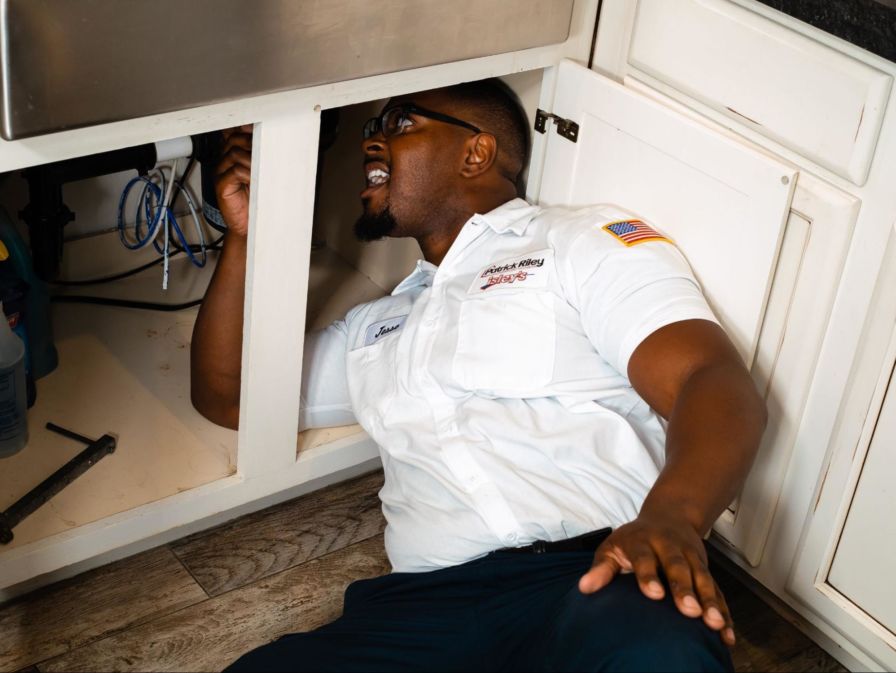How to Clean and Unclog a Garbage Disposal
November 02, 2024

When your garbage disposal starts to smell funky, or if water doesn't flow through it as readily as it should, it could be a sign of a clog. Of course, you want your garbage disposal up and running again quickly, but you'll need to identify the cause before you can fix it.
Troubleshooting your garbage disposal is a complex task, but this guide walks you through it, including:
- Safety precautions
- Everyday cleaning & usage best practices
- Common garbage disposal clogs
- The benefits of hiring a trained plumber
Of course, due to safety concerns with garbage disposals, we strongly recommend trusting a professional with repairs and maintenance.
Problems With Slow Draining From Your Garbage Disposal? Call Patrick Riley | Isley’s!
Tired of trying to figure out how to unclog a garbage disposal? Patrick Riley | Isley’s is here to help with honest, upfront pricing and fast response times. Plus, our Phoenix pros guarantee your 100% satisfaction every time.
Safety Precautions
Your garbage disposal is a crucial part of your kitchen. It helps grind food waste to prevent clogs in your pipes. However, its blades can be dangerous, so you should take precautions any time you plan to fiddle with it.
Before reaching into your garbage disposal, ensure it's powered down. This can be done by turning off the breaker. Make sure you’ve got the right breaker by attempting to turn it on. Once you've confirmed the garbage disposal is disconnected from its power source, it's safe to clean out.
You might also want to turn off the water to your kitchen sink to prevent any potential leaks or water damage while you work.
Everyday Cleaning & Usage Best Practices
Bad smells and clogs in your garbage disposal can happen with improper cleaning and usage. Not all food waste is meant to go into a garbage disposal. Grease and oil, for example, can cause clogging issues. Corn husks, artichokes, and fibrous vegetables such as celery can tangle around the blades. Large numbers of eggshells or seafood shells can also pose a problem.
You may want to consult your garbage disposal's instruction manual for a more comprehensive list of what it can and cannot handle. Some heavy-duty disposals can make quick work out of items that would clog an older model.
Learning how to clean a garbage disposal is also important to maintain it. One of the simplest cleaning tricks is to throw around two cups of ice and a cup of rock salt or vinegar down the drain. Run cold water and turn on the disposal. Within seconds, much of the grinders' grime gets rubbed off and washed away.
Mix a gallon of water with a tablespoon of bleach for a weekly clean and slowly dump it into the drain. Once you've poured it all in, run hot water down it for a few minutes.
Common Garbage Disposal Clogs
Knowing what's likely to cause a clog can help you avoid making simple mistakes that can result in a lot of cleanup work. Food that can't easily be chopped or ground up is often the biggest culprit behind garbage disposal clogs. This may include fruit pits, chicken bones, and large quantities of eggshells that can block the drain. This problem becomes compounded if you leave food waste in the disposal without running it, and the food begins to rot or mold. The sludge it creates can become an issue.
Pouring fats and oils down the drain can also be a problem. These materials can congeal and clog up the system. Rather than pouring oils, fats, or grease down your garbage disposal, find a way to dispose of it with your solid waste, such as pouring it into a jar or bottle and throwing it in your trash.
Some people may be tempted to run non-food items through their garbage disposal. However, foils, paper towels, and other kitchen items won't readily grind up and pass through the pipes.
The Benefits of Hiring a Trained Plumber
If your garbage disposal isn't working as it should, you could spend time and effort trying to figure out why it's clogged. Or, you could trust a trained professional to get the job done right the first time.
A trained plumber is well-versed in navigating the common causes of garbage disposal clogs and can troubleshoot quickly and safely. The result? Your garbage disposal gets fixed, while you get to enjoy peace of mind and the time you can spend on other tasks instead.
Satisfaction Guaranteed, Every Time
When you need plumbing services, Patrick Riley | Isley's is the one to call. Our flexible scheduling means you get quick service. Need to break up your payments? Talk to us about our flexible financing options.
Get 10% off (Up to $150)

Ty Lindsay is the Director of Field Operations at Patrick Riley | Isley’s and a 15-year veteran of the plumbing and HVAC trades. In 2010, Ty earned his Journeyman’s plumbing license. He became a Master Plumber five years later and earned his Journeyman HVAC technician’s license that same year. Ty’s breadth of knowledge in plumbing and HVAC includes both residential and commercial work. He’s been a loyal member of the Patrick Riley | Isley’s team since 2016.
- Posted in:
